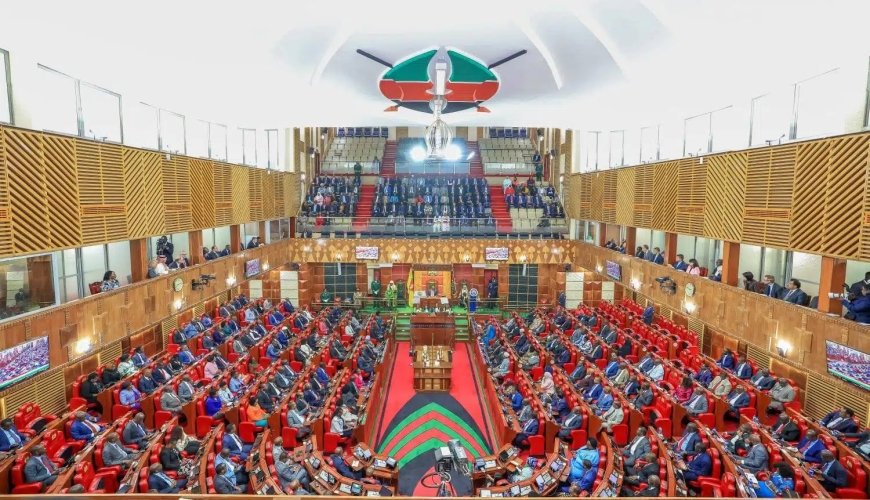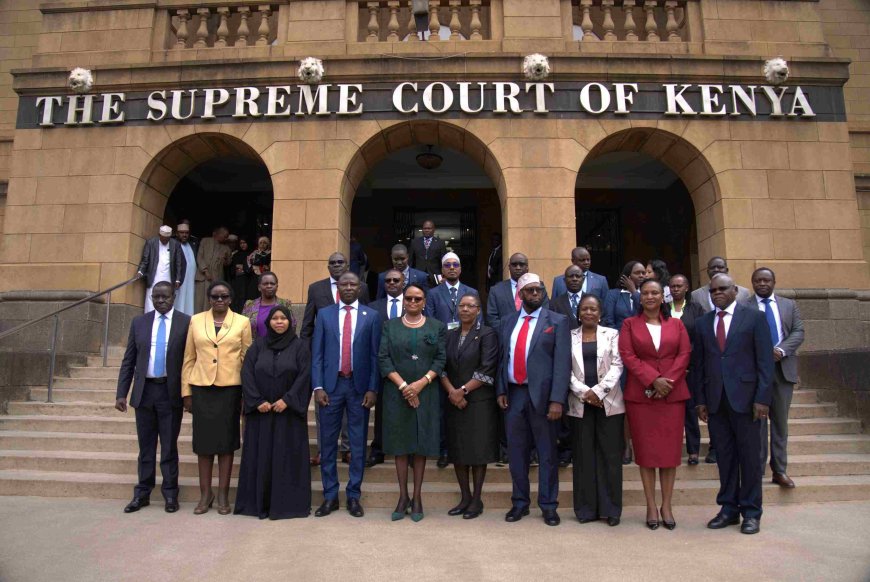How To Recall An MP In Kenya
Many Kenyans argued that the IEBC’s reconstitution offered a timely opportunity to initiate recall efforts against such lawmakers.

Shortly after the newly appointed Independent Electoral and Boundaries Commission (IEBC) was sworn in, online users renewed calls to recall Members of Parliament viewed as failing their constituents.
This push reignited conversations that first gained momentum during the June 2024 protests, when public attention turned to MPs accused of underperformance. Many Kenyans argued that the IEBC’s reconstitution offered a timely opportunity to initiate recall efforts against such lawmakers.
Beyond accusations of incompetence, the public also targeted MPs backing legislation considered harmful to ordinary citizens, suppressing civil liberties, or allegedly acting under instructions from high-ranking government officials.
Among those mentioned as possible recall candidates during the height of the debate were Kikuyu MP and National Assembly Majority Leader Kimani Ichung’wah, Nairobi Woman Representative Esther Passaris, South Mugirango MP Sylvanus Osoro, Molo MP Kuria Kimani, Belgut MP Nelson Koech, and Dagoretti North MP Beatrice Elachi.

Chief Justice Martha Koome flanked by new Independent Electoral and Boundaries Commission (IEBC) Chairperson Erastus Ethekon (left) and Attorney General Dorcas Oduor after the swearing in of the newly reconstituted IEBC team. /MARTHA KOOME
Constitutional Right to Recall
Kenyans have the constitutional right to recall their elected Members of Parliament (MPs) if they feel betrayed, misrepresented, or underserved. This right is enshrined under Article 104 of the 2010 Constitution, which states that voters can remove an MP before the end of their term. It was introduced as part of efforts to improve political accountability and deter impunity among elected leaders.
However, while the Constitution provides the foundation, the specific procedure for recalling an MP is outlined in the Elections Act (2011). Unfortunately, the law has been widely criticised for being deliberately complicated, making it extremely difficult for ordinary citizens to carry out a recall. Despite efforts by civil society and judicial intervention to streamline the process, no MP has ever been successfully recalled since the law came into effect.
Legal Grounds for a Recall
The law does not allow voters to recall an MP simply because they feel the leader is underperforming or absent from public view. Instead, it lists specific legal grounds under which a recall can be initiated. These include:
-
Gross violation of the Constitution or any other law,
-
Mismanagement or misuse of public resources,
-
Conviction for an offence under the Elections Act, such as voter bribery or election malpractice,
-
Gross misconduct that demeans the office of a Member of Parliament.
Importantly, for a recall to proceed, a High Court ruling must confirm that the MP has committed one or more of these violations. Without this court ruling, the process cannot move forward.
Time Limits and Restrictions
Even if the grounds for a recall exist, there are strict time constraints to keep in mind. A recall petition can only be filed after the first two years of an MP’s five-year term. It also cannot be filed within the final 12 months leading up to the next general election.
Additionally, only one recall petition can be filed per MP per term. If the process is attempted and fails for any reason — even on a technicality — no further attempts can be made during that electoral cycle. This legal limitation makes it crucial for petitioners to get the process right the first time.
Step-by-Step Process of Recalling an MP
The first step in the recall process is obtaining a High Court ruling that confirms the MP has committed a legally recognised offence. This requires a registered voter or concerned party to file a case in court, present evidence, and await judgment. This alone can take months and comes with legal fees and logistical demands.
Once a court ruling is obtained, a registered voter from the MP’s constituency must file a formal petition with the IEBC. This petition must include the following:
-
A copy of the court judgment,
-
A statutory declaration outlining the reasons for the recall,
-
A filing fee of approximately Ksh 30,000.
The next step is collecting signatures from voters. The law requires that the petitioner gather support from at least 30 per cent of registered voters in the constituency.
Furthermore, at least 15 per cent of voters in at least half of the constituency’s wards must be represented in the signatures. Each signature must be accompanied by the voter’s full name, national ID or passport number, voter registration details, and address.
The petitioner is given 30 days to complete this signature collection. Once submitted, the IEBC is required to verify the signatures within another 30 days.

The IEBC national tallying centre at Bomas of Kenya. /BOMAS OF KENYA
If the verification is successful and all legal requirements are met, the IEBC notifies the Speaker of the National Assembly and the MP in question. The MP is allowed a response period, during which they can contest the petition or offer a defence.
Recall Referendum
If the process proceeds without a successful legal or procedural challenge, the IEBC must organise a recall election within 90 days. This is not a by-election in the traditional sense, but rather a yes-or-no vote in which registered voters in the affected constituency are asked whether the MP should be recalled.
A simple majority of valid votes cast is enough to remove the MP from office. There is no minimum voter turnout required, though this aspect of the law has been contested in the past. Once the vote is conducted and the majority supports the recall, the seat is declared vacant.
By-Election After a Successful Recall
If a recall referendum results in the removal of an MP, the IEBC is mandated to conduct a by-election to fill the vacant seat. Interestingly, the recalled MP is allowed to contest in the by-election unless the reason for their removal was a conviction under the Elections Act or a violation of Chapter Six of the Constitution, which deals with leadership and integrity.
This clause has drawn criticism from transparency advocates, who argue that allowing a recalled MP to return undermines the spirit of accountability.
Challenges Facing the Recall Process
Despite its constitutional basis, the process of recalling a Member of Parliament in Kenya is riddled with challenges. The requirement of a High Court ruling sets the bar incredibly high. For most citizens, pursuing legal action is both expensive and time-consuming.
The signature threshold — 30 per cent of all registered voters in a constituency — is also considered unrealistic, especially in larger electoral areas where registration exceeds 100,000 voters. Mobilising such numbers within 30 days requires substantial financial and organisational resources.
There is also limited public awareness of how the process works, coupled with fears of political retaliation. Furthermore, concerns have been raised about the neutrality and capacity of the IEBC, which plays a critical role in verifying signatures and organising recall elections.
Recent Recall Campaigns
In 2024, the public mood shifted sharply after the passage of the controversial Finance Bill, which sparked nationwide protests. Several MPs were accused of ignoring their constituents' interests by supporting the bill. This led to a wave of youth-led recall campaigns, particularly online.
One notable case was in Kabete Constituency, where a citizen initiative sought to recall the area MP. The organisers claimed to have collected thousands of signatures within days, signalling rising public engagement and frustration. Political parties such as Orange Democratic Movement (ODM) also hinted at using the recall law to punish rebel MPs who defied party positions.
While none of these efforts had reached the final stage by mid-2025, they reflected a growing public interest in using constitutional tools to demand accountability.
The Path Ahead
Although no MP has ever been recalled in Kenya, the recent surge in political activism suggests that the law may soon be tested more seriously. There have been calls to amend the Elections Act to make the process more realistic and accessible, including proposals to lower the signature threshold and eliminate the requirement for a High Court ruling before initiating a recall.
Until such reforms are enacted, recalling an MP in Kenya will remain a difficult task — but not an impossible one. It is a legal right available to every registered voter, and with the right strategy, funding, and grassroots mobilisation, it could become a powerful tool for strengthening democracy and holding leaders accountable between elections.







